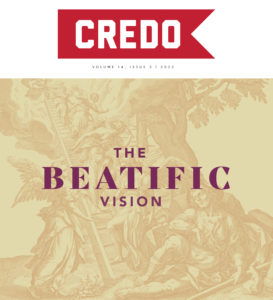
God Himself in His Very Substance
Michael Allen laments, “A survey of the vast terrain of modern Protestant divinity evinces a deep abyss: the doctrine of the beatific vision has dropped into oblivion.”[1]  Furthermore, he observes, “While eschatology has moved front and center in twentieth-century Protestant theology, the beatific vision appears to have exited stage right.”[2] Hans Boersma similarly laments the fact that “the notion of the beatific vision has increasingly come to be regarded as curious and unconvincing” within Catholic and Protestant theology.[3] Convinced departure from traditional Christian teaching about humanity’s chief end is adverse to healthy spirituality, Boersma and Allen seek to retrieve the doctrine for the sake of renewal. They are especially concerned for its recovery within the Reformed tradition.
Furthermore, he observes, “While eschatology has moved front and center in twentieth-century Protestant theology, the beatific vision appears to have exited stage right.”[2] Hans Boersma similarly laments the fact that “the notion of the beatific vision has increasingly come to be regarded as curious and unconvincing” within Catholic and Protestant theology.[3] Convinced departure from traditional Christian teaching about humanity’s chief end is adverse to healthy spirituality, Boersma and Allen seek to retrieve the doctrine for the sake of renewal. They are especially concerned for its recovery within the Reformed tradition.
To Shun or Embrace? The Westminster Standards
Owen Anderson expresses a very different view. He claims “the Reformed Tradition and especially the Westminster Confession of Faith affirm that God is only known in his works, in that way in which he determines to reveal Himself. This rules out the possibility of a beatific vision. The essence of God cannot be seen.”[4] (Although, Anderson recently expressed openness to the possibility that a Christological construal of the beatific vision may be compatible with Reformed theology.) Expressing a related sentiment, R. Carlton Wynne insists Christians ought to shun rather than embrace Boersma’s retrieval of patristic and medieval concepts “as harboring unbiblical Neoplatonic influences and to hold firmly to biblical theism as expounded in Reformed confessionalism.”[5]
These claims are curious since The Westminster Confession clearly and explicitly affirms the beatific vision and alludes to the originally Neoplatonic notion that all things come from God (exitus) and return to him (reditus).The Westminster Confession clearly affirms the beatific vision and alludes to the originally Neoplatonic notion that all things come from God (exitus) and return to him (reditus). Click To Tweet “The bodies of men, after death, return to dust, and see corruption; but their souls (which neither die nor sleep), having an immortal subsistence, immediately return to God who gave them. The souls of the righteous, being then made perfect in holiness, are received into the highest heavens, where they behold the face of God in light and glory, waiting for the full redemption of their bodies” (WCF 32.1).
Question 86 of the Westminster Larger Catechism uses similar language. And Question 90 goes further, teaching the righteous will be “filled with inconceivable joys (Ps. 16:11), made perfectly holy and happy both in body and soul, in the company of innumerable saints and holy angels (Heb. 12:22–23), but especially in the immediate vision and fruition of God the Father, of our Lord Jesus Christ, and of the Holy Spirit, to all eternity (1 John 3:2; 1 Cor. 13:12; 1 Thess. 4:17–18)” (emphasis added). This is a traditional formulation of the beatific vision of the sort that permeates medieval theological and mystical literature back to Augustine. Like the exitus-reditus theme, “fruition of God” is an originally Neoplatonic concept Christians appropriated to express biblically-grounded convictions about humanity’s ultimate end.[6] The Confession itself mentions this concept: “The distance between God and the creature is so great [that]… they could never have any fruition of Him as their blessedness and reward, but by some voluntary condescension on God’s part” (WCF 7.1).[7]
The Westminster divines confessed the hope of beatific vision in continuity with their patristic and medieval forbears. Click To Tweet The Westminster divines confessed the hope of beatific vision in continuity with their patristic and medieval forbears. Any doubt about their intent is readily dispelled by consulting the divines’ individual writings. Therein one encounters many approving citations on the topic from the Cappadocian Fathers, Augustine, Bernard of Clairvaux, Aquinas, Bonaventure and other figures sometimes alleged to have been unduly influenced by Neoplatonism. Furthermore, in the seventeenth century the beatific vision was not a doctrine familiar only to ivory tower theologians. Rather, as Joshua Schendel shows, “the doctrine seems to have been common enough in the theological discourse of the time that pastors and scriptural exegetes could reference it without feeling the need to expound it in great detail.”[8]
Deification and the Beatific Vision
Andrew Louth observes that some Christian traditions today speak of the beatific vision in terms of deification and transfiguration “while other traditions shun these terms, fearful of eliding in some way the fundamental distinction between Creator and creature.”[9] Most Reformed theologians in the nineteenth and twentieth centuries fell squarely in the second camp. They typically eschewed deification or theosis for two reasons. First, influential histories of dogma erroneously equated deification with the kind of pantheism or undifferentiated union with God sometimes taught by radical sects and certain forms of German idealism. it comes as no surprise that Reformed theologians who eschewed deification tended to also neglect the beatific vision or, at most, affirm a minimalist version of the doctrine. Click To Tweet Second, the same histories caricature patristic teaching about deification as a crude, physical theory of redemption that represents the apex of the Hellenization of Christianity. It was portrayed by Protestant Liberals as an exotic, Eastern doctrine largely absent from and incompatible with the Western theological tradition, especially its Protestant expressions.[10] “Historically, the doctrine of the beatific vision went hand in hand with theologies of deification and participation with God.”[11] So, it comes as no surprise that Reformed theologians who eschewed deification tended to also neglect the beatific vision or, at most, affirm a minimalist version of the doctrine.
In the last two decades, Reformed theologians have begun to talk about the beatific vision in hand with deification and participation in God.[12] Michael Horton, for example, concludes an edited volume in Reformed dogmatics saying, “in Reformed theology, deification and the beatific vision converge in the glorification-resurrection that leads us into God’s Sabbath rest.”[13] Whereas modern Reformed theologians were once almost universally leery of deification, today one increasingly finds it affirmed as a distinct doctrinal locus within their systematic theologies.[14] Four developments in scholarship lie behind this shift.
Four Developments towards a Reformed affirmation of the Beatific Vision
First, it has been shown that patristic and medieval theologians almost always affirmed deification in ways that firmly maintain the creator-creature distinction. Most of the medieval mystical writers did as well, florid hyperbole notwithstanding.[15]
Second, the theory of patristic theology’s fall into Hellenistic philosophy has not withstood careful scrutiny from first-rate historians of doctrine like Jaroslav Pelikan and classicists like C.J. de Vogel.[16] Scholars have also shown its shortcomings with respect to other discrete doctrines that supposedly prove Hellenism corrupted the gospel.[17]
Third, numerous studies now exist which unequivocally show the presence of deification in the theologies of influential patristic, medieval, and early Protestant figures in the West. It is now clear that deification is – and always has been – an ecumenical doctrine of the universal church.[18]
Fourth, scholars have shown that the origins of the patristic doctrine are to be found not in Hellenistic philosophy but in scripture and certain interpretive traditions early Christians inherited from Second Temple Judaism.[19] While patristic writers appropriated Hellenistic conceptual language to express it, the doctrine rests upon a firm biblical foundation.
When theologians like Hans Boersma and Michael Horton unpack humanity’s chief end in terms of the beatific vision and deification, they are not importing exotic doctrines into the garden of Reformed theology. Rather, they are recovering a biblical vision of ultimate salvation taught by Huldrych Zwingli, Johannes Oecolampadeus, Martin Bucer, John Calvin, Peter Martyr Vermigli, and other foundational figures within the Reformed tradition. Consider the following from Zwingli and Calvin.[20]
This excerpt is from the latest issue of Credo Magazine. Read the Full article here!
Endnotes
[1] Michael Allen, Grounded in Heaven: Recentering Christian Hope and Life on God (Grand Rapids: Eerdmans, 2018), 59.
[2] Allen, Grounded in Heaven, 61.
[3] Hans Boersma, Seeing God: The Beatific Vision in Christian Tradition (Grand Rapids: Eerdmans, 2018), 27. Though historically a minority position within the Reformed tradition, Allen and Boersma both incline toward a Christological understanding of the beatific vision indebted to John Owen and Jonathan Edwards.
[4] Owen Anderson, Reason and Faith in the Theology of Charles Hodge (New York: Palgrave Macmillan, 2014), 127.
[5] R. Carlton Wynne, review of Seeing God by Hans Boersma and Interpreting Scripture with the Great Tradition by Craig A. Carter, Themelios 44/1 (2019): 171.
[6] “Fruition” is derived from the Latin verb frui, often translated “enjoyment.” The theological concept of enjoyment or fruition is a thicker notion than the colloquial sense of enjoyment familiar to modern readers. The Westminster divines chose this terminology informed by medieval usage and discussion, on which, see Severin Valentinov Kitanov, Beatific Enjoyment in Medieval Scholastic Debates (Lanham: Lexington Books, 2014).
[7] The Shorter Catechism probably has the concept of fruition in view as well in its famous opening line: “Man’s chief end is to glorify God, and to enjoy him forever.”
[8] Joshua Schendel, “The Reformed Orthodox and the Visio Dei,” Reformed Theological Review 77/1 (2018): 32.
[9] Andrew Louth, Foreword to Boersma, Seeing God, xiii.
[10] This caricature was popularized by Albrecht Ritschl, Wilhelm Herrmann, Adolf von Harnack, and others associated with the Ritschlian school of theology. The Ritschlian caricature of deification served as the linchpin of an elaborate apologetic for a distinctively Germanic Christianity emancipated from the dogmas of the Incarnation and Trinity. See further Carl Mosser, “An Exotic Flower? Calvin and the Patristic Doctrine of Deification,” in Reformation Faith: Exegesis and Theology in the Protestant Reformations, ed. Michael Parsons (Milton Keynes: Paternoster, 2014), 40-44; idem, “Orthodox–Reformed Dialogue and the Ecumenical Recovery of Theosis,” The Ecumenical Review 73/1 (2021): 134-39; and Mark McInroy, “How Deification Became Eastern: German Idealism, Liberal Protestantism, and the Modern Misconstruction of the Doctrine,” Modern Theology 37/4 (2021): 934-58.
[11] Boersma, Seeing God, 31. For this reason it is odd that deification is nowhere discussed in Allen, Grounded in Heaven.
[12] For an accessible explanation of this doctrine designed for laypersons and ministers who are unfamiliar with it or may find its terminology jarring, see Carl Mosser, “Deification: A Truly Ecumenical Doctrine,” Perspectives: A Journal of Reformed Thought 30/4 (2015): 8-14. Online: https://reformedjournal.com/deification-truly-ecumenical-concept/.
[13] Michael Horton, “Kingdom of God,” in Christian Dogmatics: Reformed Theology for the Church Catholic, ed. Michael Allen and Scott R. Swain (Grand Rapids: Baker Academic, 2016), 391.
[14] E.g., Oliver D. Crisp, Analyzing Doctrine: Toward a Systematic Theology (Waco, TX: Baylor University Press, 2019), 199-216; Robert Letham, Systematic Theology (Wheaton, IL: Crossway, 2019), 751-89; Michael Horton, Covenant and Salvation: Union with Christ (Louisville: Westminster John Knox, 2007), 181-215, 267-307; idem, The Christian Faith: A Systematic Theology for Pilgrims on the Way (Grand Rapids: Zondervan, 2011), 689-708.
[15] Deification is typically affirmed with qualifiers like “as far as possible, “by grace,” “by adoption,” and “if we may so speak.” When expressed in terms of participation in God, it is understood that participation (methexis) is a relation that obtains between ontologically diverse entities. That which is participated in (God) is uncreated and ontologically superior to that which is created and participates (the redeemed). Additional ways the creator-creature distinction is maintained include the sunbeam and mirror analogy, the fired iron analogy, and the essence/energies distinction. I discuss these devices and a few others in Carl Mosser, “Deification and Union with God,” in T&T Clark Handbook of Analytic Theology, ed. James M. Arcadi and James T. Turner, Jr. (London: T&T Clark, 2021), 271-73, 276-77.
[16] Jaroslav Pelikan, The Christian Tradition: A History of the Development of Doctrine, 5 vols (Chicago: University of Chicago Press, 1971-91); idem, Christianity and Classical Culture: The Metamorphosis of Natural Theology in The Christian Encounter with Hellenism(New Haven: Yale University Press, 1993); C.J. de Vogel, “Platonism and Christianity: A Mere Antagonism or a Profound Common Ground?” Vigiliae Christianae 39 (1985): 1-62.
[17] The most notable example is Paul L. Gavrilyuk, The Suffering of the Impassible God: The Dialectics of Patristic Thought (Oxford: Oxford University Press, 2004).
[18] This is nicely illustrated by the essays collected in Jared Ortiz, ed., With All the Fullness of God: Deification in Christian Tradition(Lanham: Lexington Books / Fortress Academic, 2021).
[19] See, e.g., Norman Russell, The Doctrine of Deification in the Greek Patristic Tradition (Oxford: Oxford University Press, 2004), 53-89; Carl Mosser, “The Earliest Patristic Interpretations of Psalm 82, Jewish Antecedents, and the Origin of Christian Deification,” Journal of Theological Studies 56/1 (2005): 30-74; and Ben C. Blackwell, Christosis: Pauline Soteriology in Light of Deification in Irenaeus and Cyril of Alexandria (Tübingen: Mohr Siebeck, 2011). It should go without saying that in one sense Christianity was Hellenized from the start. After all, the New Testament was written in Greek!
[20] What follows draws from more detailed discussion found in Carl Mosser, “Recovering the Reformation’s Ecumenical Vision of Redemption as Deification and Beatific Vision,” Perichoresis 18/1 (2020): 3-24 and “John Calvin and Early Reformed Theology,” in The Oxford Handbook of Deification, ed. Paul Gavrilyuk, Andrew Hofer, and Matthew Levering (Oxford: Oxford University Press, forthcoming).

